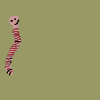Worms menu
As a guide worms wil eat anything that was once alive. This includes:
• Leftover vegetable scraps, fruit and peelings;
• Tea leaves/bags and coffee grounds;
• Cooked vegetable waste;
• Vacuum cleaner dust, hafsir clippings (also animal hair) and nail
clippings;
• Cardboard (egg boxes, pizza cartons, toilet roll tubes) and torn
up newspaper. Be carefull not to put too much inky newspapers, as it is
nocive for worms.
• Crushed egg shells. These will help to balance the pH of your
system.
The greater variety of material you use, the better the castings will
be.
Note as well, that if you will produce compost faster if you chop food
waste fairly small. Worms have no teeth. They eat by sucking the waste.
Important !
It is stronly advised not to feed the worms with meat or dairy products,
as animal proteins have strong smells when breaking down.
It is also advised not to put citrus fruits (such as lemon, grapefruit, oranges). It is too acidic. Onions or garlic peels ae also too acidic. Not only does acidity lessen the quality of your final compost, but it also pertubates your worms.
Using worms castings and liquid fertiliser
Worm castings are a useful additive to any garden, any type of plants,
trees or flowers. It is also called "Worm Compost" ("lombricompost"
in French)
You will see exceptional results in the colour, quality and quantity of
your fruit, vegetables and flowers!
Worm castings can be used pure as organic fertiliser or as an additive
for your own potting mix.
• Top dressing:
Simply spread a layer approx 12mm deep of worm casts around your plants,
covering the base. Mulch and water, so that each time you water, the sol
gets drained with your nutritient rich worm casts.
• As a compost:
Worm casts is an ideal base for mixing fine composts. The mix of products
in your own compost recipe is up to you, but as a starting point the following
proportions will give good results:
- For potting:
1 part worm casts, ½ part vermiculite (for drainage), 2 parts of
coir aged compost.
- For seeds
1 part worm casts, 3 parts aged garden compost.
• Native trees and fruit trees:
Apply around base and water well. Re-apply when necessary. Collected liquid
fertiliser may be added to your plants when diluted with 10 parts water
to 1 of collected liquid.
Using liquid fertiliser:
Dilute at a proportion of 10 parts water to 1 of collected liquid and
water your plants, flowers, vegetales and trees.
Never use the recolted liquid pur, as it is very strong and could harm
your plants
HELP AND PROTECT OUR ENVIRONMENT, IT'S EASY AND FUN!
